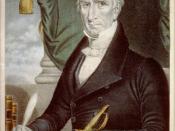Differences between political parties, during around the time James Monroe was president in 1817, was not a problem. The Era of Good Feelings, as it was called, was a time when there was a single-party system. This was so, because the Federalist party was no longer a national party and the only national party that remained was the Democratic Republicans. The Democratic-Republicans diverged into two different parties, the Democrats and the Whigs. The cause of this split into a second-party system lied with opposition toward Jackson because of the inevitable lack of representation only a single party could provide.
The Whigs grew because of the hostility they shared toward Jackson because of his controversial views and actions. Jackson was against the national Bank, he viewed it as giving an unfair advantage to some businesses as it would loan money to those businesses. Moreover, this bank was far superior than state banks, something Jackson, again, disagreed with.
Jackson opposed the bank because he saw it as a monopoly, but this opposition was out of mere ignorance because the bank stimulated the economy with its loans and distribution of credit. When the second national Bank was to be rechartered, he vetoed it on the basis that the bank was unconstitutional. Many were vastly disturbed with Jackson's actions.
The biggest problem here was that Jackson misused his veto power. It came to a point where he would be related to a monarch; and thereto the term Whig refers to a person during the Revolution that was against powerful executives. Moreover, Jackson was referred to as "King Andrew." There was so much friction between groups like Jackson's and Martin Van Buren, against William Harrison, and John Calhoun, that almost an Anti-Jackson party formed, or in this case the Whig party.
For a time...


